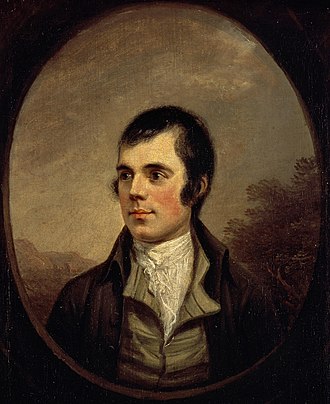“To a Louse, On Seeing One on a Lady’s Bonnet at Church” is a poem written by Robert Burns (1759–1796), first published in 1786.
The poet notices a lady in church with a louse that is crawling around in her bonnet, of which she is blissfully unaware. Chastising the louse for not recognising how distinguished its host is, he muses on how horrified the woman would be if she knew that she was harbouring a common parasite in her hair.
The moral of the poem is expressed in the final stanza:
O wad some Pow’r the giftie gie us
To see oursels as others see us!
Consisting of eight verses, the poem is written in the style known as the Burns stanza,[a]So-called because Burns used it frequently in his poetry.[1] or Standard Habbie after the Scottish piper Habbie Simpson, although it originated in medieval France;[2] each verse is six lines long, and rhymes AAABAB.[3]
Poem
Ha! whare ye gaun, ye crowlan ferlie! Your impudence protects you sairly: I canna say but ye strunt rarely, Owre gawze and lace; Tho’ faith, I fear ye dine but sparely, On sic a place.
• ferlie: vermin[4]
Ye ugly, creepan, blastet wonner, Detested, shunn’d, by saunt an’ sinner, How daur ye set your fit upon her, Sae fine a Lady! Gae somewhere else and seek your dinner, On some poor body.
• wonner: a nasty, unpleasant, mischievous or insignificant creature[5]
Swith, in some beggar’s haffet squattle; There ye may creep, and sprawl, and sprattle, Wi’ ither kindred, jumping cattle, In shoals and nations; Whare horn nor bane ne’er daur unsettle, Your thick plantations.
• haffet: part of the head above and in front of the ears[5]
Now haud you there, ye’re out o’ sight, Below the fatt’rels, snug and tight, Na faith ye yet! ye’ll no be right, Till ye’ve got on it, The vera topmost, towrin height O’ Miss’s bonnet.
• fatt’rels: loose pieces of trimming.[6]
O Jenny dinna toss your head, An’ set your beauties a’ abread! Ye little ken what cursed speed The blastie’s makin! Thae winks and finger-ends, I dread, Are notice takin!
O wad some Pow’r the giftie gie us To see oursels as others see us! It wad frae monie a blunder free us An’ foolish notion: What airs in dress an’ gait wad lea’e us, And ev’n Devotion!

